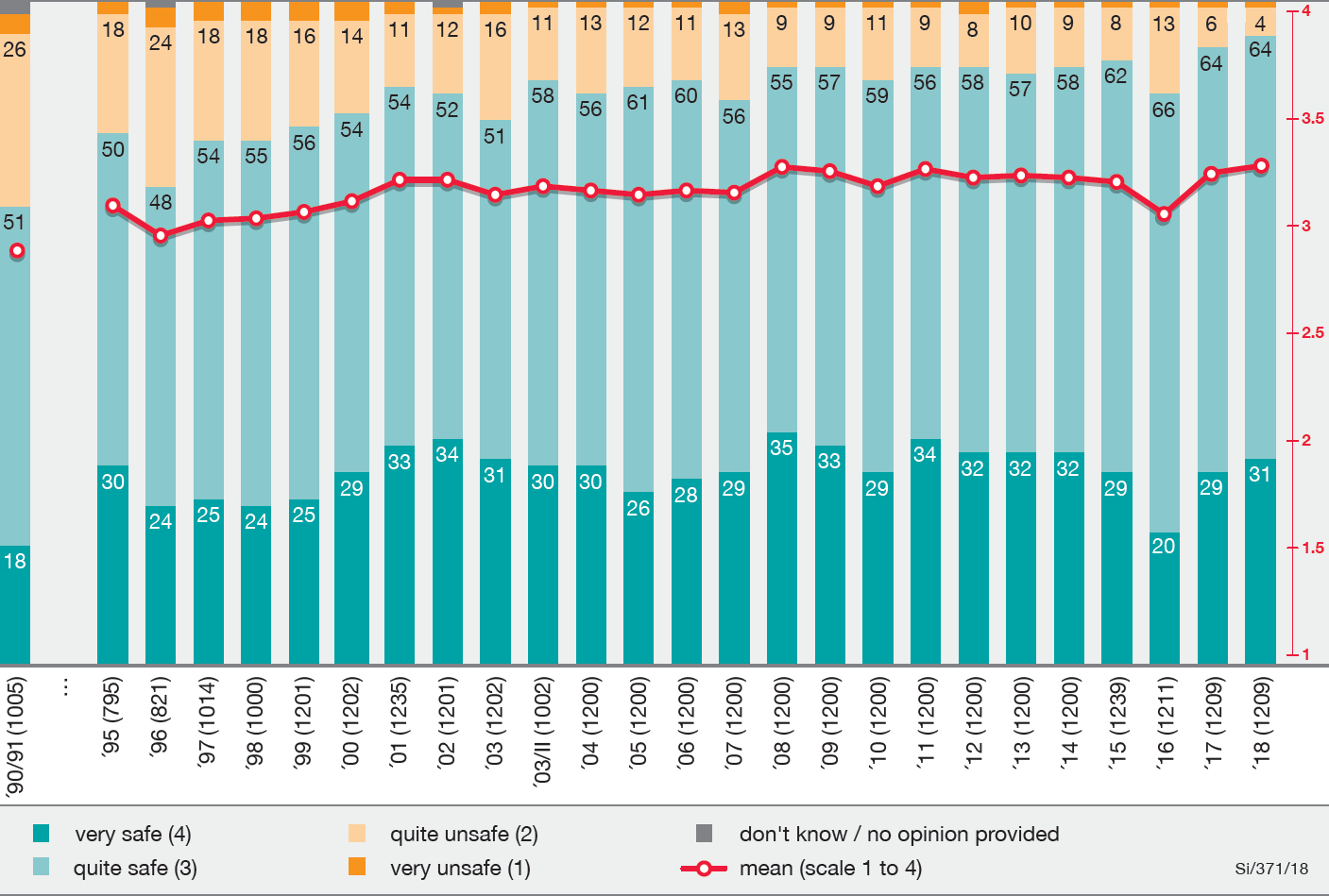The Military Academy at ETH Zurich and the Center for Security Studies at ETH Zurich have published the annual survey «Sicherheit 2018». Since 1999, the study has evaluated long-term trends and tendencies in public opinion on foreign, security and defense policy issues in Switzerland.
«Sicherheit 2018» is based on representative surveys conducted each year. As well as including a core set of questions that are always included or asked at irregular intervals, the survey also addresses current issues of security policy. In 2018, special attention was paid to the communication efforts of the army regarding a possible mandatory day of orientation for women as well as to the fight against terrorism. Below, you will find an executive summary of the findings.
Sense of Security and Perception of Switzerland and the World
In 2018, the Swiss generally feel very safe. Moreover, they are significantly more optimistic about Switzerland’s future and less pessimistic about future developments with regard to the global political situation. Fear of crime is minimal and has not changed in comparison with the previous year. Significantly more respondents feel safe in public areas.
“Generally speaking, how safe do you feel these days?”

Trust in Authorities and Institutions
The police and the judiciary continue to enjoy the highest levels of trust, followed by the Federal Council and the Swiss economy. The armed forces and the parliament occupy the middle range of values. Newly, the media occupies the second-lowest position on the trust index, just above the political parties. The average trust in authorities and institutions surveyed remains the same as in the previous year, whereas trust in the media has risen significantly compared to the previous year while trust in the armed forces and the parliament has significantly decreased.
Freedom and Security
The Swiss ascribe equal values to security and freedom. If, however, these two concepts are mentioned within the context of the fight against terrorism, restrictions on freedom are tolerated by a clear majority. As the approval for more vigorous combatting of right-wing extremism remains at a high level, significantly more respondents support more intensive combatting of left-wing extremism.
Autonomy and Willingness to Open Up
Again, in 2018 the Swiss population’s limited willingness to open up continues to be evident. The desire for economic and political independence remains at a high level. While moderate forms of cooperation without institutional ties are supported by a majority of the population, cooperative forms which would require institutional ties are clearly rejected. Establishing closer ties with institutions like the EU or NATO, as well as joining such institutions, is hence only supported by a small number of respondents. The use of Switzerland’s good services for purposes of mediation and conflict resolution continues to enjoy majority support. However, approval for increasing development aid has decreased significantly, yet still enjoys support by a majority.
Neutrality
The Swiss population clearly supports Swiss neutrality, with the principle of neutrality enjoying almost unanimous approval. The perception that Switzerland’s close economic and political ties make the exercise of neutrality impossible lost support in 2018. Approval for differential neutrality reached the lowest value yet measured and is only accepted by just under half of the Swiss population.
Attitudes towards the Swiss Armed Forces
A clear majority of the Swiss consider the Swiss Armed Forces necessary. Satisfaction with the performance of the armed forces is average and the militia system is supported by a majority of the population. One half of the respondents perceive the level of defense expenditures to be exactly right. A majority support an obligatory orientation day for women. The Swiss currently exhibit a positive attitude towards the armed forces. However, the level of awareness concerning the reform project Armed Forces Development (AFD) is very limited.
Read the publication here.
For more information on issues and events that shape our world, please visit the CSS website.


